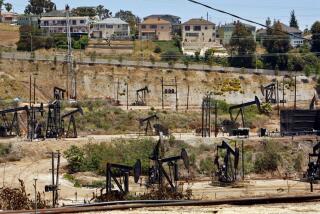ORANGE COUNTY VOICES SAFE ENERGY : Bounty of Clean Fuel and Revenue Can Be Tapped Offshore at Low Risk : Development of the vast natural gas reserves lying off the California coast would benefit the environment.
- Share via
The Clean Air Act will soon be debated on the House floor. Perhaps the most contentious part of that debate concerns the best way to reduce overall emissions of sulfur dioxide, which causes acid rain, by 10 million tons per year by the year 2010.
Natural gas, universally recognized as a “clean” fuel, will play an important role in meeting this ambitious goal. With 11 trillion cubic feet of this clean fuel lying off the California coast, an energy policy which encourages the development of these reserves carries with it important environmental benefits as well.
The recent oil spill off Huntington Beach has once again forced us to scrutinize our national energy policy, especially as it affects Californians.
How aggressively should we develop the estimated 4 billion barrels of oil and 11 trillion cubic feet of natural gas that lie untapped off the California coast?
What are the safest forms of energy, from the perspective of both the environment and human health?
Will nuclear power prove to be an environmentally sound alternative to the generation of energy from “dirty” fossil fuels such as oil and coal?
All forms of energy production entail some degree of risk. Coal mining, one of the world’s most dangerous occupations, has killed or disabled tens of thousands of men and women and prompted Congress to establish the Black Lung Disability Trust Fund to help the victims of black lung disease and their survivors. In 1989, almost 83,000 minors or their survivors received $627 million under this program.
The oil industry, too, has incurred innumerable safety problems related to the transport of oil on tankers. Even the development of our offshore oil reserves and the nuclear industry, two of the safest forms of energy, have been plagued by human error and acts of God.
Absent the option of folding up our tent and returning to a pre-industrial way of life without electricity, air conditioning, automobiles or running water, U.S. policy makers have a responsibility to guarantee access to safe and reliable sources of energy.
Economic and national security considerations dictate that as much of this energy as possible come from domestic sources. Current policies, however, discourage domestic energy exploration and development.
In 1989, the U.S. imported 42% of its oil from abroad, adding $40 billion to our trade deficit. The Energy Information Administration, moreover, expects our reliance on foreign oil to increase throughout the 1990s.
Of course, the more foreign oil we import, the greater our reliance on tankers to deliver it.
The Huntington Beach spill illustrates the pitfalls of an energy policy which places too much reliance on accident-prone tankers.
Our offshore reserves of oil and natural gas are a safe and strategically vital alternative which we have unfortunately ignored. Offshore drilling on the California coast began in 1894 and today produces 28,000 barrels of oil each day from 35 platforms. These platforms have had an exemplary safety record since the 1969 blowout off the Santa Barbara coast, accounting for less than 2% of all the oil spilled into the oceans each year since. In fact, of the 351 million barrels of oil produced on offshore platforms in 1986, only 610 barrels were spilled.
It is also important to recognize that the development of offshore oil and gas reserves has generated substantial revenues for both the federal government and the state of California.
California has received $356 million from outer continental shelf leases that adjoin state waters, 27% of the total, and has invested these funds in new roads, police protection, child care and education. But more can be done to recognize the contribution these communities make to America’s energy independence.
To that end, Rep. Dana Rohrabacher (R-Lomita) wants to allocate one-third of the revenues received from new offshore oil platforms to local communities, one-third to state governments and one-third to the federal government. The proposal deserves serious attention and the support of those communities that have sacrificed for the national interest.
The political opponents of offshore development, tragically, have succeeded in imposing a moratorium on the development of new reserves off the California coast. Unfortunately, the tanker accident which spilled thousands of barrels of oil onto Huntington Beach has led some to call for further bans on offshore drilling when, in fact, even a cursory analysis of the incident vindicates those of us who have stood steadfastly behind offshore drilling. The drilling is an alternative that would reduce our use of tankers.
In my opinion, by increasing our reliance on tankers, the proponents of the moratorium have unintentionally increased the likelihood of tanker-related mishaps in the future.
More to Read
Sign up for Essential California
The most important California stories and recommendations in your inbox every morning.
You may occasionally receive promotional content from the Los Angeles Times.













